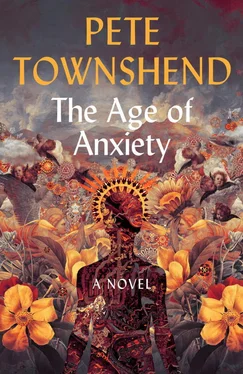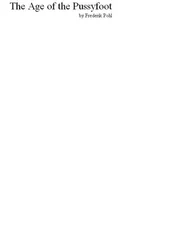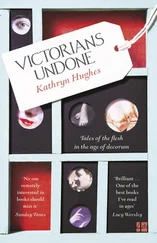Paul Jackson, I now recalled, had been a sixties rock star turned movie actor in the midseventies who had been the founder of Hero Ground Zero . The band’s name had been meant to echo the kind of anger and frustration of his young audience in the language Salinger had used in The Catcher in the Rye . A critic described Holden Caulfield as a “hero ground-zero.”
“What is it exactly you wish to show me? Are you an artist?” At the time my roster of artists was full, every one of my clients a difficult creature in one way or another. I was anxious not to overburden myself.
“Oh no,” she responded quickly. “I am not the artist in this instance. Can I come and see you?”
A few days later Maud Jackson came to my apartment-cum-gallery in Richmond in west London. As I opened the door to her I smiled involuntarily.
“Mrs. Jackson.” I hesitated. “Do come in. I was expecting someone—”
She cut in. “Younger? Older?”
“Not at all!” Indeed, her age was immaterial at this precise moment. Assessing her quickly, as you do when someone new arrives at your door and you must invite them in and make them feel comfortable, I experienced a small but perceptible flutter in the region of my heart. Her face seemed familiar.
Maud Jackson walked past me into my apartment with an elegance and dignity that—as I watched her from behind—made me feel lascivious. I quickly checked myself. But there was something intriguing about the way she moved. The tilt of her head as she turned and held out her hand to me made me feel I had met her before. The shade of her graying hair suggested that she had once been a natural blonde. Her skin was starting to loosen a little and to discolor slightly, and its tone was uneven, but her strong cheekbones pointed to a striking beauty, or at least a diverting prettiness, that she must have enjoyed when she was younger. She was not tall, but had a strong and upright posture that gave her presence. Her shoulders were square; she might have once been a competitive swimmer. Her eyes were a pale blue, her unsettling gaze hinting at a more vibrant past; she had a frank and direct way of looking at you. I estimated her age at between forty-five and fifty. It was hard to tell.
I ushered Maud into my living room, decorated with the work of many of the artists I represent. I have kept a lot of the finest pieces for myself, and that has been the investment that makes me Walter’s equal, financially speaking. Maud immediately walked across to an intriguing piece given to me by its creator: a calendar painting covered in dates and numbers.
“I love this,” she exclaimed. “Who is it by?”
“Simeon Blake. He has an extraordinary memory for dates and historical events, and the progression in this painting revolves around my date of birth and leads both back and forward several thousand years.”
“He uses a computer or something to establish that your birthday fell on a Wednesday in 1945?”
“He makes that computation mentally, and all the progressions involved, in microseconds. In this painting he has selected only my birthdays on June twentieth if they happen to fall on a Wednesday. Not only that, but he can attach significant events, happenings, and facts to every day he selects.”
“Remarkable!” Maud leaned closer to the painting as if in doing so she might unlock the mystery of Simeon’s gift. “I see that he hasn’t attached any significant world events here on your birthday.”
“My birthday fell close to the end of the Second World War—”
“As did mine,” she interjected, giving me the opportunity to say that she looked younger than her years. Thank heavens I avoided doing that; it would have been corny. She was the same age as me, then, fifty?
“Ah! So…” I bumbled along, increasingly drawn to this attractive middle-aged woman.
“A few months,” she said, “before the news of the gas chambers was published.”
“Ah, yes,” I replied. “My mother Claire was Jewish.”
“And so—you?” she asked.
“My father was not Jewish, and my mother’s family were all killed in the war. Anyway, I live a secular life. I’m not sure about God. Are you?”
“Once I would have agreed with you. But recent events have made me revise what I grew up believing, or rather not believing.”
I offered tea, which she accepted, and I went to the kitchen and poured boiling water over the leaves in the pretty blue china pot I only brought out for visitors. Her voice carried from the living room, and again my heart bumped. Did she sound like my long-lost wife? I couldn’t place what was giving me that pain in my heart.
I carried in the tea and set it down.
“So,” I urged. “Please tell me what you have to show me.”
As she gathered herself I sensed she had something of a tale to tell. “My husband grew old in his band. His bandmates were younger than he was and always wanted to do more touring than he felt comfortable with. In the early seventies there was no sign of the touring slowing down.”
“My godson Walter is a musician,” I said, interrupting her. “He was a huge fan of your husband’s band when he was a kid.”
I immediately felt I’d said the wrong thing, casting Maud Jackson’s husband as a has-been from years gone by. I tried some redress: “But of course Hero Ground Zero continued to enjoy lots of hits, didn’t they?”
She shook her head. “Their last big hit was in the early seventies. But by 1975, despite the lack of hits they’d enjoyed at the start, audience demand for their live shows was still growing around the world. I saw less and less of my husband Paul as the years went on.”
At this moment Maud became real for me. She was a good-looking woman married to a hugely successful rock star who had probably spent much of her life overshadowed by him, and perhaps alone and lonely.
I knew Jackson had acted in a movie. Walter had always been a big fan of Hero Ground Zero before becoming an R&B purist. Later, I did some research and got the whole story. At forty-three years old, worn down by commercial success with no creative expression, Jackson had broken up his band at the height of its success in 1979 in order to become an actor. The film— The Curious Life of Nikolai Andréevich— was written and directed by John Boyd, an eminent British cinematographer, with Jackson in the role of Andréevich, a charismatic musician who starts a religious cult.
“Paul found acting extremely tough,” Maud continued. “Rising before dawn and working until after midnight every day for several months was very different to the kind of intense but sporadic work he’d done in the band. Also, in the band he had been the boss. He’d had control of the schedule and the workload. He’d become a very heavy drinker but he stopped in order to cope with what he knew would be a punishing filming schedule. To his credit, John Boyd never pretended the filming would be easy for my husband. But he was a famously hard-driving and meticulous director. Paul reached a kind of pinnacle of anxiety as the filming of the last scene approached. He knew that soon he was going to have to fend for himself again, freed from the discipline of filming that had helped him stay sober.”
Maud wondered if I had ever seen the film.
“I did see it, yes,” I replied.
“Do you remember the final scene?”
I tried to summon up the iconic image; I remembered it had been absurd in a way, and rather overblown. Maud saved me the trouble; she rustled through the contents of her bag and produced a dog-eared page torn from the shooting script of the film. She handed it to me.
Light. Blinding white light. A man is standing with his back to us, arms outstretched. He is naked to the waist. His hair is golden, curling, shoulder length. We cannot see his face. As we slowly approach the man from behind, he begins to block the light. The sun is setting. His hair creates a halo. Suddenly the man leaps forward and we fly with him, sailing through the sky, over the blue-green landscape toward the sunset.
Читать дальше












